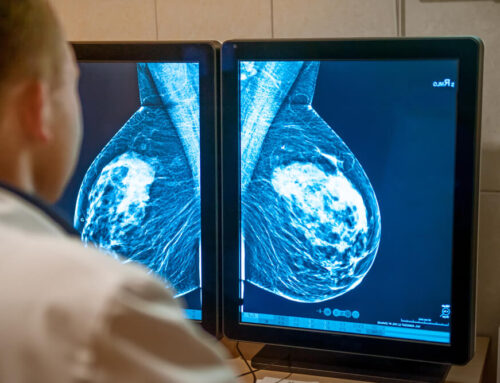Lymph nodes play an important role in your immune system. When discussing serious illnesses like breast cancer, lymph nodes are responsible for alerting your body of bacteria or viral infections and fighting against infection and disease. Still, since the lymphatic system acts as our body’s “sewage system”, lymph nodes may carry cancer cells. However, before we dive too deep into why your doctor would recommend lymph node removal, let’s talk a little about how lymph nodes work.
What Is the Lymphatic System
The lymphatic system is an intricate network of lymph nodes connected by blood vessels that carry a fluid called lymph. Lymph nodes contain special white blood cells called lymphocytes that can rapidly multiply and release antibodies that help your body fight bacteria, viral infections, and cancer cells. The role of the lymphatic system is expansive:
- It manages all fluid levels in the body
- It reacts to bacteria
- It deals with cancer cells
- It deals with cell waste products that would otherwise turn into disease or disorders
- It absorbs some of the fat in our diet from the intestines
It’s important to remember that the blood in our vessels is under constant pressure that transfers nutrients, fluid, and other cells to other body tissues in need of oxygen and food. Any fluids, waste products, or bacteria that are leaked into our tissues are carried away by the lymphatic system. When this vital system does not work properly, tissues become swollen and puffy. If it lasts for a short period, it is called edema. If it lasts for longer than three months, it is called lymphedema.
Lymph nodes act as filters and are found in various parts of our bodies like the armpits, throat, chest, groin, and abdomen. Typically, you’ll find them in groups or chains and are part of our body’s defense system. Bacteria or cancer cells that are leaked from tissues or flow into the lymph will end up being attacked by the special white blood cells of the lymph nodes. When you have an infection, the level of lymphocyte production increases and the lymph nodes will swell.

Lymphatic System and Breast Cancer
The breast has its own network of blood vessels called the vascular system that works in conjunction with the lymphatic system in carrying blood and fluid back and forth from your breast tissue to the rest of your body. If a problem arises like breast cancer and those cells break into the blood vessels or lymph channels, your lymphatic system goes to work. Your lymph nodes will swell as they try to filter out these cancer cells. However, this is called avascular or lymphatic system invasion that increases the risk of cancer cells spreading to other parts of the body. This is a sure sign that something is not right and may be accompanied by other symptoms. Those symptoms include:
- You’ll notice a lump or swelling in your neck, under your arm, or in your groin.
- Swelling in your stomach if cancer has spread to your liver.
- You’ll experience shortness of breath if cancer has spread to your lungs
- You may experience pain and headaches.
- You may also experience seizures or dizziness.
Lymph Node Removal
If you’ve been diagnosed with invasive breast cancer, your doctor may suggest lymph node removal, also called lymphadenectomy. Depending on where the breast cancer cells have traveled, this may include the lymph nodes in the armpit, lymph nodes in breast, or lymph nodes in arms. It is highly likely that lymph nodes in your arms and breasts will be removed during a mastectomy or lumpectomy. The specific characteristics and size of breast cancer will determine how many lymph nodes are removed.
Your doctor will use a precise system for diagnosis and treatment of breast cancer that has spread to the lymph nodes. They will classify your cancer in stages using a TNM system:
- T (tumor) – Your doctor will evaluate the size and extent of the tumor
- N (number) – Your doctor will evaluate the number of tumors that contain cancer.
- M (metastasis) – Your doctor will determine whether cancer has spread to other parts of your body and to what extent.
Metastatic breast cancer refers to breast cancer that has spread to nearby lymph nodes and other organs like bones, lungs, liver, or the brain. Biopsies and imaging tests will help your doctor determine the extent of cancer and the number of lymph nodes affected. After this information is analyzed, your doctor will recommend lymph node removal surgery along with breast cancer surgery.
Benefits of Lymph Node Removal Surgery
There are two main reasons why lymph node removal would be beneficial if you have breast cancer. First, one or more lymph nodes may be removed and analyzed to see where cancer has spread. This information is vital for your doctor to create the best plan for cancer treatment. Second, if these tests indicate that cancer has spread, lymph node removal helps to dramatically reduce the chance of cancer coming back. There two different types of lymph node removal surgeries:
- Sentinel lymph node biopsy/removal – These lymph nodes are found “downstream” from breast cancer and are the first to show evidence of breast cancer if cancer cells have traveled into the lymphatic system.
- Axillary node dissection – This procedure removes some of the axillary lymph nodes, also known as lymph nodes located in the underarm. Once they are removed, they are examined.
It’s important to note that lymph nodes don’t always need to be removed. However, when breast cancer has been detected and a lumpectomy is recommended, women in early-stage breast cancer can be treated with radiation rather than lymph node removal. Those patients having a mastectomy with a positive sentinel node will undergo removal of lymph nodes in the armpit.
You may experience long term effects of lymphadenectomy called lymphoedema. It is the swelling of other parts of your body due to the lack of drainage of lymph fluid. You could experience lymphoedema if you’ve had several lymph nodes removed.
More recently, the National Cancer Institute has released information regarding lymph node removal trials and concluded that women with early-stage breast cancer who have experienced a lumpectomy may require less extensive lymph node surgery. This is important for breast cancer patients because it reduces the side effects of lymphadenectomy without reducing a women’s survival rate.

Request Your Appointment Today
Our surgical services are conducted with the highest standards and the most up to date technology by board-certified and seasoned experts in the field. Specifically, we provide sentinel node biopsy services where a tracer material is injected into the breast and is followed to the sentinel nodes. They are then removed for analysis and treatment. These are the first lymph nodes that drain the breast and the body’s first line of defense for preventing the spread of breast cancer to other areas of the body.
We specialize in the surgical treatment of benign and malignant breast disease with a personal approach that supports our patients throughout their journey. Additionally, we provide comprehensive evaluations, genetic counseling, high-risk screening, and customized treatment plans tailored to your specific needs. Trusted and preferred by patients and physicians alike, we are proud of our reputation for quality care and results.
Request your appointment with one of your board-certified physicians today!







Leave A Comment
You must be logged in to post a comment.